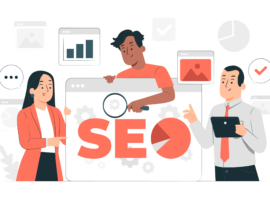The Role of AI in Shaping Digital Marketing Strategies
AI in Digital Marketing
The digital marketing landscape is undergoing a seismic shift, driven by artificial intelligence (AI). No longer confined to sci-fi narratives, AI now powers everything from personalised ad campaigns to real-time customer interactions. In 2023, brands using AI-driven strategies reported a 27% increase in ROI compared to traditional methods, according to a McKinsey study. This article explores how AI tools and techniques are redefining marketing efficiency, creativity, and scalability.
Why Does It Matter for Marketers?
Artificial intelligence refers to systems that mimic human cognitive functions—learning, problem-solving, and decision-making. For marketers, AI’s value lies in its ability to process vast datasets, identify patterns, and execute tasks at speeds impossible for humans.
Consider this: 74% of companies using AI for marketing report improved customer satisfaction due to faster, more accurate service (Salesforce, 2024). AI matters because it addresses three core challenges:
- Scalability: Automating repetitive tasks like email segmentation.
- Precision: Predicting customer behaviour with 90%+ accuracy in retail sectors.
- Cost Efficiency: Reducing ad spend waste by targeting high-intent audiences.
The Evolution of AI in Marketing
AI’s journey in marketing began with basic automation—think email scheduling tools like Mailchimp. Today, it’s evolved into predictive intelligence, where algorithms forecast trends before they emerge.
- 2010s: Rule-based automation dominated (e.g., “if-then” workflows).
- 2020s: Machine learning models analyse historical data to predict outcomes (e.g., Shopify’s AI forecasting a 35% sales surge for a fashion brand during holidays).
- 2024 and beyond: Generative AI crafts bespoke content, while neuromarketing tools gauge emotional responses to ads.
Key AI Applications in Modern Marketing Strategies
AI is no longer a passive tool; it actively shapes digital marketing in ways that would have been unimaginable a decade ago. From refining customer targeting to automating interactions, AI has revolutionized the way brands connect with their audiences.
Marketers who embrace AI-driven solutions can improve efficiency, enhance personalization, and create more engaging customer experiences.
Hyper-Personalisation: How AI Drives Customer-Centric Campaigns
Gone are the days of generic “Dear Customer” emails. Hyper-personalisation uses AI to analyse browsing history, purchase data, and social activity, creating tailored experiences.
- Netflix saves $1 billion annually by recommending content based on viewing habits.
- Spotify’s “Wrapped” campaigns generate 60 million social shares yearly by curating individualised music summaries.
Enhancing Customer Experience 24/7
- Modern chatbots like Zendesk’s Answer Bot resolve 70% of queries without human intervention, slashing response times from hours to seconds.
- Sephora’s chatbot increased makeup appointment bookings by 11% through personalised product suggestions.
- Bank of America’s Erica handles 50 million client requests quarterly, reducing call centre costs by $2 million monthly.
Predictive Analytics: Forecasting Trends and Consumer Behaviour
- Predictive analytics tools like IBM Watson analyse historical and real-time data to anticipate market shifts.
- Walmart uses AI to predict inventory demand, reducing overstock costs by 15%.
- Starbucks leverages location and weather data to suggest seasonal drinks, boosting sales by 20% during winter months.
AI Tools Transforming Digital Marketing
The rapid development of AI-powered tools has given marketers a new set of capabilities to refine targeting, analyze consumer data, and create content at scale.
Machine Learning Algorithms for Targeted Advertising
Platforms like Google Ads and Meta’s Advantage+ utilise machine learning to optimise bids, audiences, and creatives in real time.
Stat: Programmatic ads powered by AI account for 88% of US digital display spending (eMarketer, 2024).
Natural Language Processing (NLP) in Content Creation and SEO
- NLP tools like Grammarly and Frase.io analyse search intent, optimise keywords, and generate SEO-friendly content.
- The Guardian uses AI to draft preliminary news reports, cutting editorial time by 30%.
- HubSpot’s Content Strategy Tool identifies gaps in competitors’ content, increasing organic traffic by 55% for users.
AI-Driven Analytics Platforms
GA4 integrates AI to predict metrics like churn risk and lifetime value. Features include:
- Audience Segmentation: Auto-clustering users based on behaviour.
- Predictive Metrics: Forecasting future purchases with 85% accuracy.
- Cross-Platform Tracking: Unifying data from apps, websites, and IoT devices.
Emerging AI Trends in Digital Marketing
The marketing landscape is constantly shifting, and AI is playing a pivotal role in redefining how brands interact with consumers. As technology advances, marketers must anticipate changes in search behavior, content creation, and digital engagement to stay relevant. AI is not just automating processes; it is enabling entirely new ways of reaching audiences and delivering more personalized experiences.
Voice Search Optimization
More than half of global searches now happen through voice assistants like Siri, Alexa, and Google Assistant. This shift is forcing brands to rethink SEO strategies. People don’t type the same way they speak—voice queries tend to be longer, more conversational, and intent-driven. Businesses that fail to adjust may lose visibility. To stay ahead, they need to prioritize long-tail keywords, question-based content, and structured data markup to improve voice search rankings.
Creating Content at Scale
AI-generated content is changing the way brands approach storytelling and visual marketing. Tools like ChatGPT produce text at an unprecedented rate, while DALL-E and Midjourney generate unique visuals in seconds. Businesses can now produce blog posts, ad copy, and even entire video scripts without relying solely on human effort. However, while AI accelerates content production, maintaining originality and brand voice remains crucial. Marketers should use generative AI as a tool to enhance creativity, not replace it entirely.
AI and the Metaverse: Redefining Customer Engagement
The metaverse is no longer just science fiction—it’s a growing digital space where brands are experimenting with virtual storefronts, interactive experiences, and AI-powered customer service. AI is instrumental in making these interactions seamless. AI-driven avatars can act as customer service representatives in virtual environments, while predictive analytics help brands understand user behavior in real-time. Companies like Nike and Gucci are already investing in metaverse experiences, proving that digital-first engagement is a rising trend.
Integrating AI with Other Technologies
AI is not just operating in isolation—it works best when combined with other emerging technologies. The fusion of AI with big data, IoT, and advanced analytics is creating powerful marketing ecosystems that help brands understand, predict, and respond to consumer needs with more accuracy. This convergence allows companies to move beyond generic campaigns and develop highly adaptive, data-driven marketing strategies.
Analyzing Consumer Behavior with Precision
Data is everywhere, but making sense of it is a challenge. AI and big data analytics work together to help marketers break down vast amounts of consumer information into meaningful patterns. AI can detect subtle behavioral shifts, predict purchase intent, and refine customer segmentation with far more accuracy than traditional analytics tools.
For instance, e-commerce platforms use AI-driven insights to recommend products based on real-time shopping behavior. Streaming services like Netflix analyze viewing habits to suggest personalized content. This level of data-driven precision gives businesses a significant advantage in understanding customer preferences and adjusting strategies accordingly. By combining AI with big data analytics, marketers gain a granular understanding of consumer preferences, purchase patterns, and market trends. AI-driven insights help brands tailor marketing strategies with pinpoint accuracy.
Creating a Seamless Digital Experience
The Internet of Things (IoT) is connecting everyday devices to the digital world, and AI is making these connections smarter. From smart home assistants like Amazon Echo to wearable tech like Fitbit, IoT devices gather a wealth of user data. AI processes this information in real time to offer tailored recommendations, improve customer interactions, and automate marketing efforts.
Retailers, for example, are using AI-powered IoT systems to adjust in-store displays based on customer demographics. Automotive companies integrate AI with IoT to enhance connected car experiences, offering personalized navigation and entertainment options. This integration creates a smoother, more intuitive relationship between brands and consumers, making interactions feel effortless. The Internet of Things (IoT) generates vast amounts of user data. AI processes this data in real-time, enabling hyper-personalized marketing experiences—such as smart home devices recommending products based on user habits.
Ethical and Practical Challenges of AI Adoption
As AI becomes more embedded in marketing strategies, ethical concerns and practical challenges emerge. Businesses must find a balance between using AI for personalization and respecting consumer privacy. Additionally, issues such as algorithmic bias, misinformation, and the over-reliance on automation pose significant risks. Addressing these challenges is essential to maintaining trust and ensuring AI remains a force for good in marketing.
Data Privacy Concerns
AI’s ability to analyze consumer data raises concerns about privacy. Stricter regulations like GDPR and CCPA require businesses to handle user data responsibly while maintaining personalization efforts.
Ensuring Fair and Inclusive Marketing
AI models may reinforce biases present in training data, leading to discriminatory ad targeting and exclusionary marketing. Companies must audit AI algorithms to ensure fair and unbiased decision-making.
Human vs. AI: Why Marketers Still Need Creativity and Strategy
While AI automates tasks and optimizes campaigns, human creativity and strategic thinking remain irreplaceable. AI lacks emotional intelligence, brand storytelling capabilities, and nuanced decision-making skills, making human oversight essential.





There are no comments